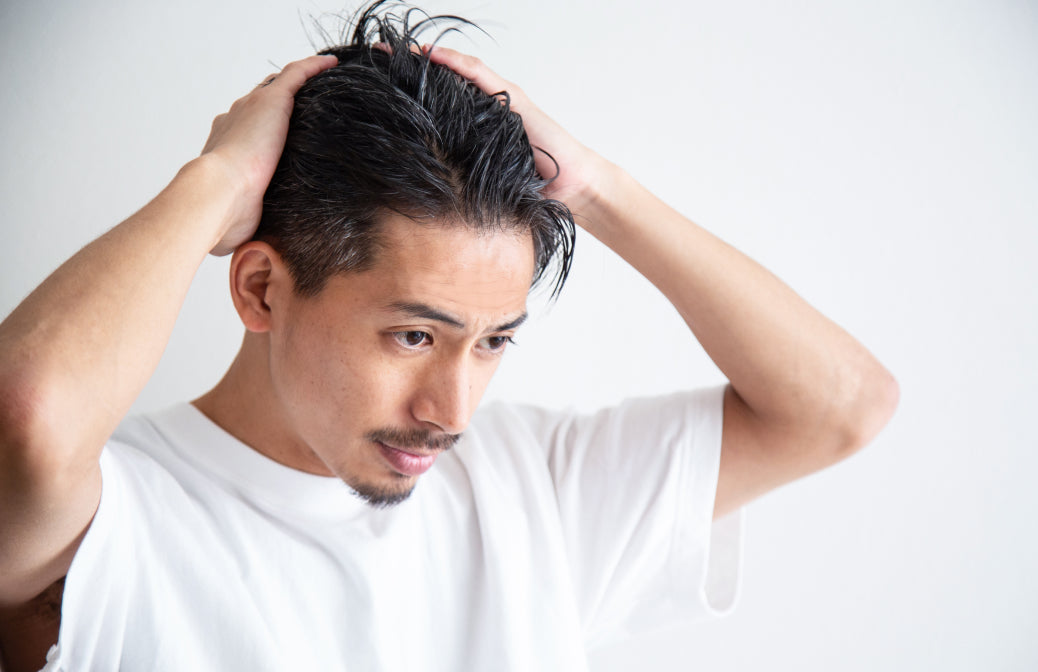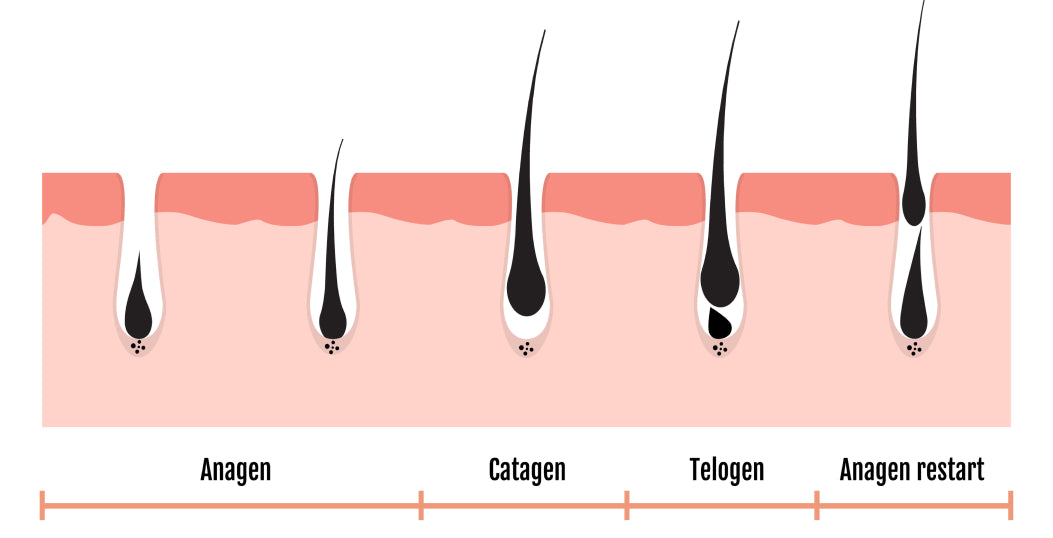What is alopecia areata?
Alopecia areata is an autoimmune disease wherein the body's immune system mistakenly attacks the hair follicles, leading to hair loss.
Often manifesting as patchy hair loss, it can result in bald spots in the affected area. There are instances where alopecia areata can lead to complete baldness, termed alopecia totalis, or even the loss of all body hair, termed alopecia universalis.
The exact cause remains uncertain, but it's believed that genetic factors combined with environmental triggers might play a role.
While there's no permanent cure, treatments aim to trigger new hair growth and manage the condition.
What are the types of hair loss?
There are several types of hair loss:
Androgenic alopecia
Known as both male and female pattern baldness, this is the most common type of hair loss and is hereditary.
Traction alopecia
This results from hairstyles that pull the hair tight, causing it to weaken over time. Overuse can lead to permanent hair loss.
Telogen effluvium
A temporary hair loss condition often following stress, shock, or a traumatic event.
Frontal fibrosing alopecia
This causes hair loss and scarring on the front of the scalp.
Scarring alopecia
Caused by complications of another condition, such as scalp psoriasis or fungal infections.
How common is hair loss in women?
Hair loss in women is more common than many might assume. While men often face male pattern baldness, women are not immune to thinning hair or bald patches.
In fact, by age 50, roughly 50% of women will experience some form of hair loss. Unlike male pattern hair loss, which usually begins with a receding hairline, female pattern hair loss often presents as a widening part or general thinning over the crown.
There are various causes and types of hair loss specific to women, and it's essential to recognize and address them early for optimal management.
What are the common causes of hair loss in women?
There are numerous causes of hair loss in women, including hormonal changes due to pregnancy, childbirth, or menopause.
Other factors like certain medications, excessive stress, and nutritional deficiencies can also contribute. Autoimmune diseases such as alopecia areata or treatments like chemotherapy can lead to hair loss as well. Other causes include:
- Hormonal Changes: Conditions like pregnancy, childbirth, menopause, or imbalances in thyroid hormones can cause temporary or permanent hair loss.
- Traction Alopecia: Constant pulling on the hair, often due to hairstyles like tight braids or ponytails, can cause this type of hair loss.
- Medications and Supplements: Some drugs, like birth control pills or certain treatments for arthritis, can cause hair loss as a side effect.
- Medical Conditions: Diseases such as scalp psoriasis, fungal infections, or even alopecia areata can lead to hair loss.
- Nutritional Deficiencies: Lack of essential nutrients, especially iron or certain vitamins, can cause hair to shed.
Recognizing the cause is crucial in determining the appropriate treatment approach and potentially reversing the condition or slowing its progression.
Which vitamins can help with hair loss?
Hair health and strength are influenced by various factors, including our diet. Vitamins play a pivotal role in maintaining not just overall health but also the vitality of our hair. When it comes to addressing hair loss, specific vitamins have shown promising results in supporting hair health and potentially reducing hair fall. Below, we list some of these essential vitamins:
Biotin (Vitamin B7)
Biotin is renowned for its role in enhancing hair's keratin structure – the primary protein constituting hair. Deficiencies in biotin can lead to thinning hair and increased hair shedding. Incorporating Biotin-rich foods such as eggs, almonds, and sweet potatoes or opting for supplements can help combat hair loss.
Vitamin E
This vitamin is loaded with antioxidant properties which can help counteract oxidative stress that potentially damages hair follicles. Regularly consuming nuts, seeds, and spinach, which are rich in Vitamin E, can help maintain vibrant and healthy hair.
Vitamin A
Critical for cell growth, Vitamin A supports the hair growth cycle and ensures that hair follicles function optimally. Foods rich in Vitamin A include carrots, sweet potatoes, and kale.
Vitamin D
Found to assist in creating new follicles, Vitamin D plays a role in hair regeneration. Exposure to sunlight and consuming foods like fatty fish, cheese, and fortified foods can boost Vitamin D levels.
Iron
Iron deficiencies can lead to hair loss, particularly in women. Ensuring an adequate iron intake from foods like red meat, spinach, and lentils can promote healthier hair growth.
Vitamin C
This vitamin helps in the production of collagen, a vital part of hair's structure. Consuming citrus fruits, strawberries, and bell peppers can ensure you're getting enough Vitamin C.
Which women are likely to experience hair loss?
Any woman can experience hair loss, but it's more common in those with a family history of baldness (either male or female pattern).
Women who have hormonal imbalances, have undergone radiation treatments, or have autoimmune disorders may also be at a higher risk.
What illness causes hair loss?
Thyroid disorders, lupus, anemia, and autoimmune diseases like alopecia areata can cause hair loss. Moreover, infections such as ringworm can invade the hair and skin of your scalp, leading to hair fall.
How will a healthcare provider diagnose hair loss in women? What tests are done?
A healthcare provider will examine the pattern of your hair loss, look for bald patches or scarring, and tug a few hairs to see how easily they come out.
They might also conduct blood tests to check for diseases that cause hair loss or scalp psoriasis. A biopsy may be done if there's inflammation or if the cause of the loss isn’t clear.
What questions might your healthcare provider ask to diagnose and categorize your hair loss?
Your healthcare provider might ask about your diet, any recent trauma or stress, medications you're taking, any family history of hair loss, and if you've noticed any patterns in the hair loss (e.g., sudden or gradual, patchy or diffuse).
How is hair loss in women treated? What medicines or supplements may help?
Treatment for hair loss depends on its cause. Mnoxidil is an over-the-counter treatment that's effective for both male and female pattern baldness.
If an autoimmune disease is the cause of hair loss, treatments might include steroids. Nutrient deficiencies can be addressed with specific supplements and hair growth shampoos or topicals might be suggested.
Top Hair Loss Treatments of 2023
1. Hair Transplant
One of the most enduring solutions to hair loss, hair transplant procedures have become more refined and efficient in 2023.
Employing techniques such as Follicular Unit Extraction (FUE) and Follicular Unit Transplantation (FUT), surgeons can now transplant hair follicles with pinpoint accuracy.
This results in a more natural look with minimal scarring. These techniques ensure that the transplanted hair grows in the same direction and pattern as the surrounding hair, creating a seamless blend.
2. Scalp Micro Pigmentation
Scalp Micro Pigmentation (SMP) has surged in popularity as a non-invasive alternative to traditional hair restoration techniques.
This method involves using tiny needles to deposit pigment into the scalp.
The result is the appearance of thousands of tiny hair follicles, creating an illusion of density and fullness.
Perfect for individuals with thinning hair, receding hairlines, or even complete baldness, SMP provides an instant boost in confidence and aesthetic appeal.
3. Topical Treatments: The Rise of Dense
While there are myriad topical treatments available in the market, one that has stood out in 2023 is by Dense Hair Experts.
Dense has introduced breakthrough formulations that directly target hair follicles, stimulating hair growth and preventing further hair loss.
Packed with vital nutrients and scientifically-backed ingredients, Dense products ensure that the scalp gets the nourishment it needs to support healthy hair growth.
Furthermore, these treatments are easy to incorporate into daily routines, making them a go-to for many experiencing hair loss or thinning hair.
For more information about Dense treatments, visit this page.
Most common questions about hair loss treatments
The most common questions are:
What's the cause of my hair loss?
Understanding the root cause of your hair loss is essential. There are many potential causes, from autoimmune diseases like alopecia areata to hereditary factors causing female pattern hair loss or male pattern baldness.
Additionally, lifestyle factors, nutritional deficiencies, or certain medications could be at play. By identifying the root cause, you can target the condition more effectively and understand the type of hair loss you're experiencing.
Are there tests I should undergo?
Depending on the suspected cause of your hair loss, various tests might be recommended. Blood tests can help diagnose medical conditions related to hair loss, such as thyroid disease.
Other tests can evaluate the health of your hair follicles, determine the type of hair loss, or check for conditions like scalp psoriasis or fungal infections that might contribute to hair loss.
What treatment options do you recommend?
Treatment options can vary widely based on the cause and type of hair loss. For androgenic alopecia, treatments like Mnoxidil might be suggested.
If your hair loss is related to an autoimmune disease or inflammation, treatments might target the underlying condition. It's also worth asking if dietary interventions or supplements might support hair health, especially if nutritional deficiencies are a suspected cause.
How can I prevent further hair loss or encourage new hair growth?
Prevention is often the best remedy. Your healthcare provider might offer suggestions based on the cause of your hair loss.
For instance, if traction alopecia is the problem, changing hairstyles can prevent further damage. To encourage new hair growth, treatments might range from topical applications to medications or dietary changes.
Understanding the hair growth cycle can also provide insights into managing and promoting growth.
What potential side effects should I be aware of with the recommended treatments?
Every treatment, whether it's a topical solution, medication, or supplement, carries potential side effects.
For example, some treatments for hair loss might cause skin irritation or changes in hair texture. Others could interact with medications or exacerbate certain conditions.
It's essential to know the potential risks and weigh them against the benefits, ensuring you're making an informed decision.









